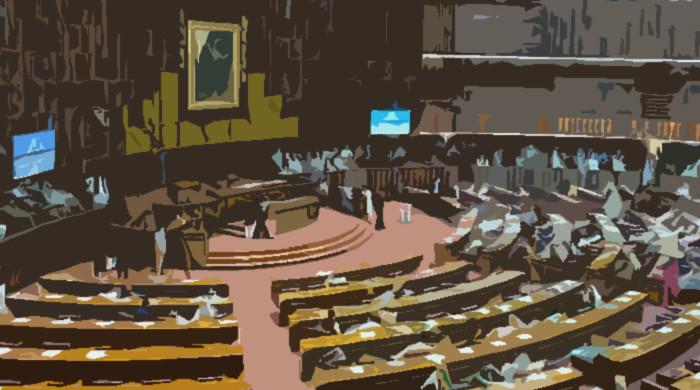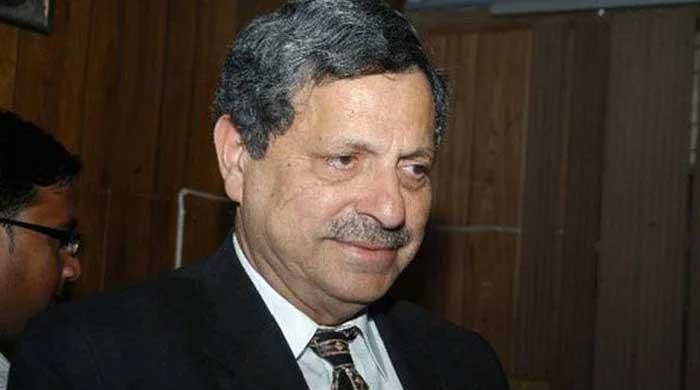Pakistan and China revive Joint Economic Committee after 11 years
Forum of JEC was put on hold as everything was finalised through CPEC instead
December 09, 2021

After an 11-year break, Pakistan and China have agreed to resume talks within the Joint Economic Committee (JEC) framework.
The JEC forum has been placed on hold as everything is being settled through the China-Pakistan Economic Corridor (CPEC) project for the last eight years, The News reported.
According to an official statement, Federal Minister for Economic Affairs Omar Ayub Khan delivered the opening remarks at the 15th Session of the Pakistan-China Joint Economic Committee on Economic, Trade, Scientific, and Technical Cooperation.
He praised China's government for hosting the JEC's 15th session after an 11-year gap.
China Vice Minister Ren Hongbin, and Economic Affairs Division Secretary Mian Asad Hayaud Din co-chaired the JEC virtual meeting.
Ayub expressed his pleasure at the completion of a 70-year friendship between Pakistan and China, which he described as "unprecedented."
He pointed to the 1982 Bilateral Agreement for the Establishment of a Joint Committee for Economic, Trade, Scientific, and Technical Collaboration as the bedrock of bilateral cooperation to emphasise the significance of the occasion.
He claimed that Pakistan and China have always backed each other up on all fronts.
Pakistan was one of the first countries to show solidarity with China when the COVID-19 pandemic broke out, and its president paid a visit to Beijing during the outbreak. Similarly, China's government aided Pakistan in pandemic preparedness.
Chinese firms offered COVID-19 vaccines on a priority basis and provided approximately four million doses of vaccines free of charge to boost Pakistan's mass vaccination programme.
The minister for economic affairs highlighted that Pakistan and China are entering into the next phase of CPEC, where Special Economic Zones (SEZs) are being established. The SEZs will attract foreign direct investment, establish industrial units, create employment opportunities and boost economic activities, he said.
Similarly, operationalisation of the Gwadar Port will also create momentum in external trade, he said, adding that China is Pakistan's largest trading partner for the last six consecutive years since 2015. At present, China is Pakistan's main source of imports and second-largest export destination, he said.
Highlighting Pakistan's immense investment opportunities in various sectors, the minister for economic affairs said Pakistan provides a conducive and liberal investment environment to foreign investors and entrepreneurs. All foreign investments are fully protected under the Foreign Private Investment Promotion and Protection Act, 1976 and Protection of Economic Reforms Act, 1992.
Special Economic Zones are also being established to meet the global competitiveness with the state-of-the-art infrastructure and connectivity, he shared. The SEZ incentive package includes 10-years income tax exemption and one-time exemption from all custom-duties and taxes on import of capital goods.
Textile, leather, pharmaceutical and surgical industries of Pakistan are considered to be best in the world and are exported around the globe, he said.
Accordingly, Chinese investors can benefit from the huge potential of Pakistan’s industrial sector.
Ayub said that the Small & Medium Enterprises Development Authority and Board of Investment of Pakistan can collaborate with Chinese counterparts to enhance cooperation in the industrial sector.
Furthermore, he highlighted the need for mutual cooperation in agricultural research, enhanced productivity, value addition and food processing through joint ventures and business-to-business contacts.
Both sides also discussed issues relating to development projects in energy, infrastructure and social sectors. They also agreed to promote investment and industrial cooperation on a fast track basis.
Din also spoke about promotion of bilateral trade cooperation, exchange of experience in poverty alleviation and establishment of joint working groups, strengthening of cooperation under multilateral framework. The economic affairs division secretary also appreciated measures taken by the Chinese government to tackle the COVID-19 pandemic.
China's vice minister commented that the fruitful discussions on bilateral economic relations between the two countries will meet the objectives of deepening bilateral relationship. He also hoped the next session of Pak-China JEC will be held in Pakistan soon.











